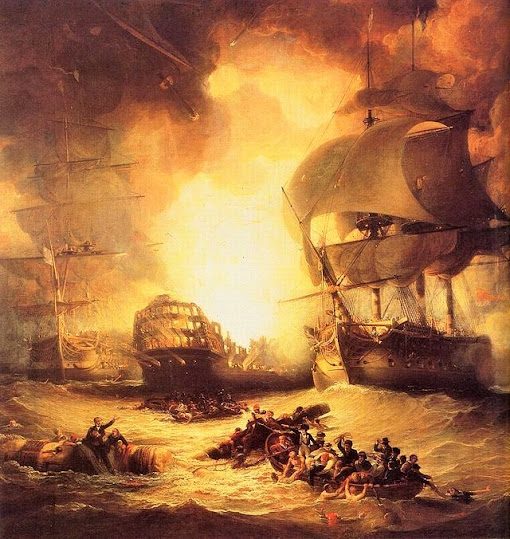The burning deck
'The Destuction of L'Orient' at the Battle of the Nile, 1 August, 1798, by George Arnald (1766-1841)When I wrote ‘the cat sits on his master’s hat’ the other day, the meter reminded me of Felicia Dorothea Hemans’ poem ‘Casabianca’, more commonly known as ‘The boy stood on the burning deck’ . The poem was written in 1826 and is an imaginative commemoration of an event in the Battle of the Nile in 1798.The battle, also known as the Battle of Aboukir Bay, was a major naval battle between the British and the French which took place from August 1st to 3rd off the Nile Delta at Aboukir Bay.
The French flagship ‘L’Orient’ was commanded by Captain Luc-Julien- Joseph Casabianca, who had his young son Giocante on board with him. He ordered his son to remain at his post, which he did, ultimately perishing when the ship exploded. More than 1,000 men were killed, 70 survivors were picked up by British ships and a few reached the shore in rafts.
The explosion of the ship was of such magnitude that all ships on both sides ceased firing for ten minutes. That may have been because they were frantically engaged in extinguishing blazes in their own ships, caused by flaming wreckage from L’Orient, which had been flung out in a wide circle.
The French boy in the poem, Giocante, resolutely obeyed his father’s orders, despite the desperation of his situation as fire burned around him. He was loyal to the end, carrying out his duty, but perhaps common sense might have made him realise his plight and attempt escape.
When should one make a stand for oneself? Remaining loyal when circumstances dictate that it would be better to change course is foolhardy and leads to much disappointment and sorrow, and, in Giocante’s case, death. It is good and honourable to put the needs of others before one’s own, but not, if by so doing, health and sanity are jeopardised. There must be compromise and an understanding that no one person is right – or wrong - all the time. Accepting responsibility for one’s actions is essential for good mental health.
Giocante grew up in an era when fathers were to be obeyed unquestioningly. Those days have passed, for most, and rightly so.
There have been many parodies of the poem, but it was very popular when first published. For about a century, until the 1950s it was widely used in schools, memorised, recited and analysed.

I hadn't known about this battle and certainly didn't know about the poem. When I was a teenager there was a ditty going around beginning with "the boy stood on the burning deck" but the rest was smut and I don't remember it.
ReplyDeleteThere are plenty of dubious versions, I'm afraid.
DeleteOf the hundreds of versions I heard, here is my favourite:
ReplyDeleteThe boy was on the burning deck
playing a game of cricket,
the ball ran up his trouser leg
and bowled his middle wicket.
'The Destuction of L'Orient' at the Battle of the Nile might be scary, but it is impressive.
I haven't heard that one before :-)
DeleteThat 'segged' well from L'Orient to some philosophy on life choices. I loved your post today and learned some snips of history as well. And to be fair to your examination of blind obedience and so on, what kind of father wouldn't tell his son to jump in the water when fire started to engulf them?
ReplyDeleteThe boy didn't know his father had perished, but even so, commonsense should surely have held sway.
DeleteThank you.
DeleteWhen l saw the name Giocante...I thought, what on earth
ReplyDeleteis she doing on a burning ship...and at 42yrs of age.....
Willie..you've got it wrong your thing of the French actress
Vahina Giocante..Oh! Sorry..! :(.
Seriously though...and I know one should'nt say it..but, that's
when battles were battles, hand to hand combat, not nice, l
know..unlike to~day, sending rockets over hundred of miles
to the enemy..HeHe! Bring back the Duke of Wellington..or
even Nelson...at least all is forgiven now...! :).
HaHa! As l always say..."I see no ships..Only hardships". :O).
I had to find out about the actress!
DeleteBattles were bloody and hard. Most sailors couldn't swim, either.
How right you are - the lilt of the well known phrase 'The boy stood on the burning deck' can produce an audible earworm enough to prod a writer's Muse into action... I can almost feel my fingers itching to put pen to paper...
ReplyDeleteOh, go on - indulge yourself!
ReplyDeleteOo - you tempter, you! Maybe tomorrow I'll give in! ♥
DeleteI didn't know of the event, or the poem. What a tragic story! xxx
ReplyDeleteYes, tragic is the right word. x x x
ReplyDeleteI remember studying this poem in school. You are right. We must see the boy on the burning deck in the context of when it happened.
ReplyDeleteVery different times.
ReplyDelete